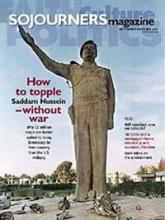Brazilian popular educator Paulo Freire probably never thought his ideas would revolutionize the fashion industry, but his student Maria Teresa Romeiro Leal has done just that. When Leal visited Rocinha—the largest slum in South America, located just south of Rio de Janeiro—with her family's housekeeper, she asked how she could implement Freire's ideas to solve the economic difficulties of the women she met. Twenty years later, Leal has a winning combination in her creation of a high-quality textile and design cooperative, Coopa-Roca, which is rocking the fashion world. For women in the slums, the textile industry in the past offered only sweatshops, but Coopa-Roca members see their own creations sported by models in London, Milan, and Rio and photographed in Elle and Vogue magazines.
"It's a huge joy," says Marta Moreira de Mesquita, a seamstress with three children who has been part of the cooperative for 10 years. The vast majority of the co-op members were dependent on their husband's income before joining Coopa-Roca. Now they can earn from $87 to $263 per month, depending on how many pieces they are able to sew or crochet.
Read the Full Article
